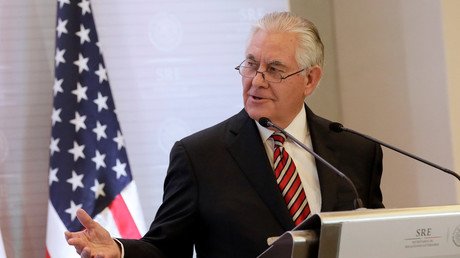US hopes Brazil's Bolsonaro will be useful counter to China, but not according to Chinese media
The rise of Brazil's far-right president has given Washington an opportunity to cement ties with a formidable Latin American ally, which it hopes to unite with in order to counter China's expanding influence in the region.
On Tuesday, January 1, 2019, Jair Bolsonaro was sworn in as the president of Brazil, having won 55 percent of the country's vote, defeating the Worker's Party's Fernando Haddad.
Shortly after being sworn in, Bolsonaro announced Brazil's "liberation from socialism, inverted values, the bloated state and political correctness."
The United States and the corporate media have had a strong disdain for some of Latin America's leadership in recent years (including Brazil's former leftist leadership), so one would expect Brazil's new administration to be no different. However, this time around, Bolsonaro appears to have emerged out of the rubble of Brazilian politics as some sort of hero for the western elite.
Also on rt.com Bolsonaro’s lavish inauguration motorcade turns farcical after horse gets spooked (VIDEO)For example, US President Donald Trump was quick to congratulate the recently inaugurated president with a tweet which read: "The USA is with you."
"Congratulations to Brazil's new President Bolsonaro," wrote former ambassador to the UN, Nikki Haley, on Twitter. "It's great to have another US-friendly leader in South America, who will join the fight against dictatorships in Venezuela and Cuba, and who clearly understands the danger of China's influence in the region."
Believe it or not, Haley's tweet wasn't for our benefit (though it did give us a great glimpse into the working mind of the US government's foreign policy agenda). No, I would bet a lot of money that Haley's tweet was for the benefit of Bolsonaro himself.
According to the Wall Street Journal (WSJ), the Trump administration has deep plans to enlist Bolsonaro in its efforts to fight a trade war with China; as well as to isolate the Venezuelan government (who surprisingly, have strong ties with both Russia and China to Washington's detriment). The WSJ explains that this plan to recruit Bolsonaro began during Secretary of State Mike Pompeo's visit to Brazil to attend Bolsonaro's inauguration on Tuesday, with China's "predatory trade and lending practices" featuring highly on the State Department's agenda.
Pompeo himself said that the rise of Bolsonaro created "a truly transformative opportunity" for the United States and Brazil. According to Pompeo, Brazil had a history of electing presidents that were enemies of the United States and that now "it is just the opposite: we are friends."
Bolsonaro apparently responded by saying he would "very much like to increasingly make up for" the distance Brazil has kept from the US previously.
Throughout his campaign, Bolsonaro echoed Donald Trump in Brazilian form as he criticised China's strategy in Latin America. Statements like the "Chinese are not buying in Brazil…They are buying Brazil" ran rampant throughout Bolsonaro's campaign, complaining that China should not be allowed to own Brazilian land or control its industries. Bolsonaro also warned against selling off state assets as it would "leave Brazil in Chinese hands."
Bolsonaro further irked the relationship with China in February last year when he became the first Brazilian presidential candidate to visit Taiwan since Brazil adopted Beijing's One China policy in the 1970s.
Also on rt.com Bolsonaro says Brazil may host US base, calls Trump 'most powerful man in the world'However, Bolsonaro's anti-Chinese rhetoric will apparently be much harder to put in practice than Bolsonaro appears to portray. For example, it is worth noting that the first diplomat to ever meet with Bolsonaro as president-elect was China's Ambassador to Brazil, Li Jinzhang.
Chinese media almost immediately got to work to oppose the idea that Bolsonaro will represent the impending doom of China's expanding influence.
The Global Times, a state-run outlet, announced that "Bolsonaro said China and Brazil are both great countries and the new government of Brazil attaches great importance to cooperation with China and is willing to push forward bilateral relations." Chinese President Xi Jinping sent his special envoy, Ji Bingxuan, to attend the inauguration ceremony in Brasilia.
Professor Severino Cabral, chairman of the Brazilian Institute for China and Asia Pacific Studies also told Xinhua that "Brazil has great relations with both China and the United States, and that cannot change." Cabral explained that China's imprint inside Brazil is "structural," and that no "Brazilian government would confront either China or the US."
China, for its part, has expressed its enthusiasm to work closer with its Brazilian counterpart.
According to Jorge Arbache, former secretary for international affairs at Brazil's planning ministry, Brazil "does not have the luxury of giving up its biggest trade and investment partner." As Arbache explains, there is "not one economy in the world that can occupy the space China occupies."
Brazil is the world's eighth largest economy, part of the so-called BRICS economic bloc which also includes Russia, India, China and South Africa. Presently, China is Brazil's largest trade partner. Trade between the two nations was an estimated $75 billion in 2017, according to Reuters. Last year, trade allegedly surpassed US$100 billion, with Brazilian exports to China sitting at $US 66.6 billion, a rise of over 32 percent from the previous year. Reuters also observed that China has invested over $124 billion in Brazil since 2003, in oil, mining and energy sectors of the economy.
"If you have a strong China, then you have a stronger Brazil because of commodities, but that depends on forces outside of Bolsonaro's control," Brian Nick, chief investment strategist for Nuveen told Forbes.
Also on rt.com US and China hold trade talks in Beijing amid three-month ‘truce’ in tariff warIt is for that reason that Bolsonaro has already begun to quieten down the anti-Chinese rhetoric, stating that he would welcome Chinese investment and meet with Chinese officials who invited him to China. He even stated that relations between the two countries would "surely become better and better."
Even the Washington Post appears to be skeptical that Bolsonaro will completely jump on board with the Trump agenda of completely isolating China on the world stage, stating that it was "unlikely" Bolsonaro would "fully embrace" the "US-led campaign to pressure China on trade policy."
"Count me as one of the skeptics that this going to amount to more than theater and rhetoric," Michael Shifter, president of a DC-based think tank known as the Inter-American Dialogue, told the Washington Post. "They may do a lot of posturing and grandstanding together that will make them feel good and tough and like powerful guys. But what does that amount to in the end? I don't know that this is the kind of romance that leads to anything concrete."
That being said, in a television interview this week, Bolsonaro did say he would be open to allowing the establishment of US military bases in Brazil to assist the US to counter Russia's expanding influence in Venezuela.
The blunt truth is that Bolsonaro represents all that we are told is at odds with the freedom and humanitarianism of American society. As Al Jazeera perfectly summed up in one paragraph:
Also on rt.com Awakening a sleeping lion: The US-China Cold War is upon us"Bolsonaro has described having a daughter as a 'weakness', told a congresswoman she was 'too ugly' to be raped, claimed some black people were not 'even good for procreation', and said he would rather one of his four sons 'die in an accident' than be gay."
Bolsonaro has also promised to wage war on Brazil's rainforests and minority communities. On his first day in office, Bolsonaro issued executive orders targeting indigenous groups, descendants of slaves and the LGBT community. One of the issued orders is predicted to make it difficult for new lands to be identified as demarcated for indigenous communities by transferring the regulation and creation of new indigenous reserves to the agriculture ministry, controlled by a powerful agribusiness sector, all the while opening up existing reserves to mining.
In less than three days, Bolsonaro has "eradicated the country's Labor Ministry, ordered monitoring of non-government and international organizations, undermined indigenous rights and excluded the LGBT community from explicit protection by the Human Rights Ministry," according to the Washington Post. He has already fired 300 "left wing" civil servants in his proposed mission to rid the country of socialism and communism.
He will also allegedly give police officers the license to kill criminals without the threat of prosecution in an attempt to curb Brazil's rising crime rate (its current homicide rate is approximately 60,000 a year). Not surprisingly, this idea has been met by extreme skepticism, as these kinds of violent measures rarely ever do anything to curb crime (and will almost certainly increase the rate of homicide). In my opinion, while Brazil continues to have a high unemployment rate of about 12 percent, crime won't stop simply because police are killing more people (take a look at the Philippines).
Not to mention Bolsonaro's unbreakable affinity with Israeli Prime Minister Benjamin Netanyahu, which will allegedly give Netanyahu the recognition of his Jerusalem embassy move – another major blow to the struggle of the Palestinian people for basic human rights.
But hey – as long as a known right-wing fascist will help the US counter China and combat the "dictatorship" in Venezuela then that makes the aforementioned okay by western standards (apparently, Bolsonaro does not quite fall into the definition of "dictator" in light of his pro-US agenda).
Like most things, Washington's true rationale behind any of its foreign policy strategies is an assessment as to the extent in which it can unleash a containment strategy against China. This was true even under the leadership of Barack Obama, and will continue to be this way regardless of who takes office, be it Kanye West or Oprah Winfrey.
Honestly, it's no wonder that Chinese President Xi Jinping's first military order of 2019 was to order the People's Liberation Army to prepare for war.
Like this story? Share it with a friend!
The statements, views and opinions expressed in this column are solely those of the author and do not necessarily represent those of RT.















